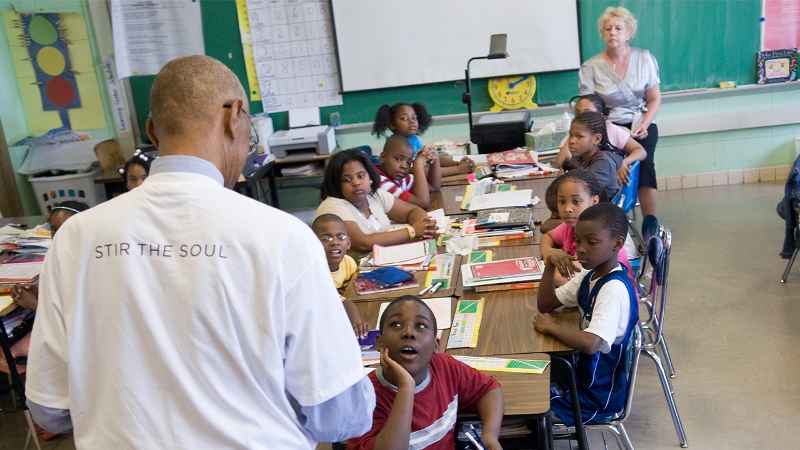The Best Primary Science Tuition Singapore for Effective Learning Methods
The Best Primary Science Tuition Singapore for Effective Learning Methods
Blog Article
Discover the Crucial Advantages of Recognizing Primary Science for Young Students
The importance of primary scientific research education and learning for young learners prolongs much beyond mere expertise procurement; it serves as a basic column in creating important abilities such as essential reasoning, problem-solving, and creativity. Involving with clinical concepts via interactive and inquiry-based tasks not only cultivates curiosity yet additionally lays the groundwork for resilient, positive learners.
Enhancing Critical Assuming Abilities
Promoting important assuming abilities in young students is crucial for their cognitive growth and future scholastic success. Critical reasoning makes it possible for youngsters to assess details, evaluate evidence, and make educated choices, which are essential abilities in today's information-rich culture. By engaging in scientific inquiry, young learners can boost these abilities as they discover ideas with monitoring, thinking, and experimentation.
In primary scientific research education and learning, teachers can help with important reasoning by encouraging students to ask questions, develop hypotheses, and conduct experiments. This hands-on method allows children to practice analytic and establish logical thinking skills. For example, when pupils examine the residential or commercial properties of materials or the principles of activity, they discover to evaluate their searchings for critically and reason based on evidence.
In addition, conversations and collaborative projects can promote essential reasoning by giving chances for students to verbalize their ideas, obstacle presumptions, and think about diverse point of views. By producing a supportive atmosphere that values inquiry and reflection, educators can support crucial thinking abilities that empower young students to end up being long-lasting learners and independent thinkers. Ultimately, enhancing these skills lays a robust foundation for their future scholastic undertakings and personal development.
Fostering Inquisitiveness and Exploration

Key science education and learning supplies a structured atmosphere where young students can explore different phenomena with hands-on experiments and monitorings. By enabling them to interact with products and participate in inquiry-based understanding, teachers create possibilities for kids to create theories, evaluate their concepts, and attract conclusions. Such experiences support a feeling of marvel and enjoyment regarding science.

Building Confidence in Problem Solving
Building confidence in problem-solving is a crucial element of key scientific research education that empowers young learners to come close to obstacles with durability and creative thinking - primary science tuition Singapore. They develop necessary abilities in vital thinking and analysis when children are urged to involve with clinical concepts with hands-on activities and inquiry-based learning. This procedure not just boosts their understanding of clinical concepts however also promotes a sense of ownership over their discovering
To construct confidence, instructors should create a helpful atmosphere where mistakes are seen as opportunities for development instead of Source failures. This urges students to take threats and check out different remedies to troubles. By supplying scaffolding and assistance, educators can assist trainees browse complicated jobs, progressively enhancing their independence in problem-solving situations.
In addition, joint understanding experiences, such as group tasks or experiments, can better enhance trainees' confidence as they find out to articulate their ideas and pay attention to others' point of views. These communications nurture social abilities and enhance the idea that problem-solving is commonly a cumulative endeavor. Eventually, cultivating confidence in analytical prepares young learners for future scholastic obstacles and furnishes them with the tools required for lifelong knowing.
Encouraging Creativity and Innovation
In the realm of key scientific research education, encouraging creativity and innovation is important for growing a vibrant understanding setting. By cultivating a culture where young learners can explore ideas and experiment openly, instructors help pupils create essential assuming abilities and an enthusiasm for discovery. Creative thinking in scientific research encourages youngsters to ask concerns, devise hypotheses, and participate in hands-on tasks that promote their imagination.
Incorporating flexible projects and inquiry-based learning right into the curriculum enables trainees to reveal their distinct viewpoints and services. As an example, when charged with addressing a problem related to their atmosphere, students can conceptualize numerous approaches, bring about innovative end results that display their creativity. This not just strengthens their understanding of scientific ideas however also instills a feeling of ownership over their understanding process.
Additionally, imaginative science education and learning nurtures cooperation among peers, as students usually share concepts and improve each other's understandings - primary science tuition Singapore. This collaborative spirit advertises not just advancement but additionally necessary social skills. Thus, by focusing on imagination and innovation in main science education and learning, we encourage young learners to think seriously, accept difficulties, and picture possibilities, laying a strong structure for long-lasting learning and expedition
Planning For Future Understanding Difficulties
Young learners' ability to navigate future knowing obstacles pivots on a solid foundation in key scientific research education. This foundational understanding equips pupils with essential assuming skills and a methodical method to analytical, important for dealing with complex concerns in an ever-evolving globe. Primary scientific research promotes inquiry-based learning, urging trainees to ask questions, discover theories, and engage in hands-on experiments.
As they create these skills, learners become proficient at analyzing information, acknowledging patterns, and drawing educated final thoughts. Such proficiencies are important not only in scientific fields yet likewise in technology, mathematics, and design (STEM), where interdisciplinary expertise is progressively important.
Additionally, primary science education grows a More Help sense of curiosity and strength in young learners, enabling them to check out challenges as opportunities for development. As they experience and get over barriers in their clinical expeditions, they build confidence in their capability to adapt and introduce.
Eventually, a solid structure in main scientific research not just prepares young learners for scholastic quests yet additionally equips them with the tools required for long-lasting discovering and flexibility in a swiftly transforming international landscape. By spending in key scientific research education and learning, we are spending in the future capacity of our learners.
Final Thought
Comprehending main science is vital for young learners, as it cultivates important thinking, curiosity, and creativity. Engaging with clinical principles with hands-on experiments improves analytical abilities and builds strength. This fundamental understanding not only gears up trainees to examine see it here information and acknowledge patterns however likewise supports an inquiry-based frame of mind. Ultimately, the advantages of primary science education and learning prepare kids for future scholastic searches and impart long-lasting knowing practices necessary for growing in an ever-evolving globe.
The relevance of main scientific research education for young learners extends far past simple expertise purchase; it serves as a fundamental pillar in developing essential abilities such as crucial thinking, problem-solving, and creative thinking. By developing an encouraging environment that values query and representation, instructors can nurture vital thinking skills that empower young learners to come to be independent thinkers and lifelong students. Therefore, by focusing on creativity and advancement in primary science education, we encourage young learners to think critically, accept difficulties, and envision possibilities, laying a strong foundation for long-lasting learning and exploration.
Young students' capacity to navigate future understanding challenges pivots on a strong structure in primary scientific research education.Understanding main scientific research is crucial for young students, as it promotes important reasoning, inquisitiveness, and imagination.
Report this page